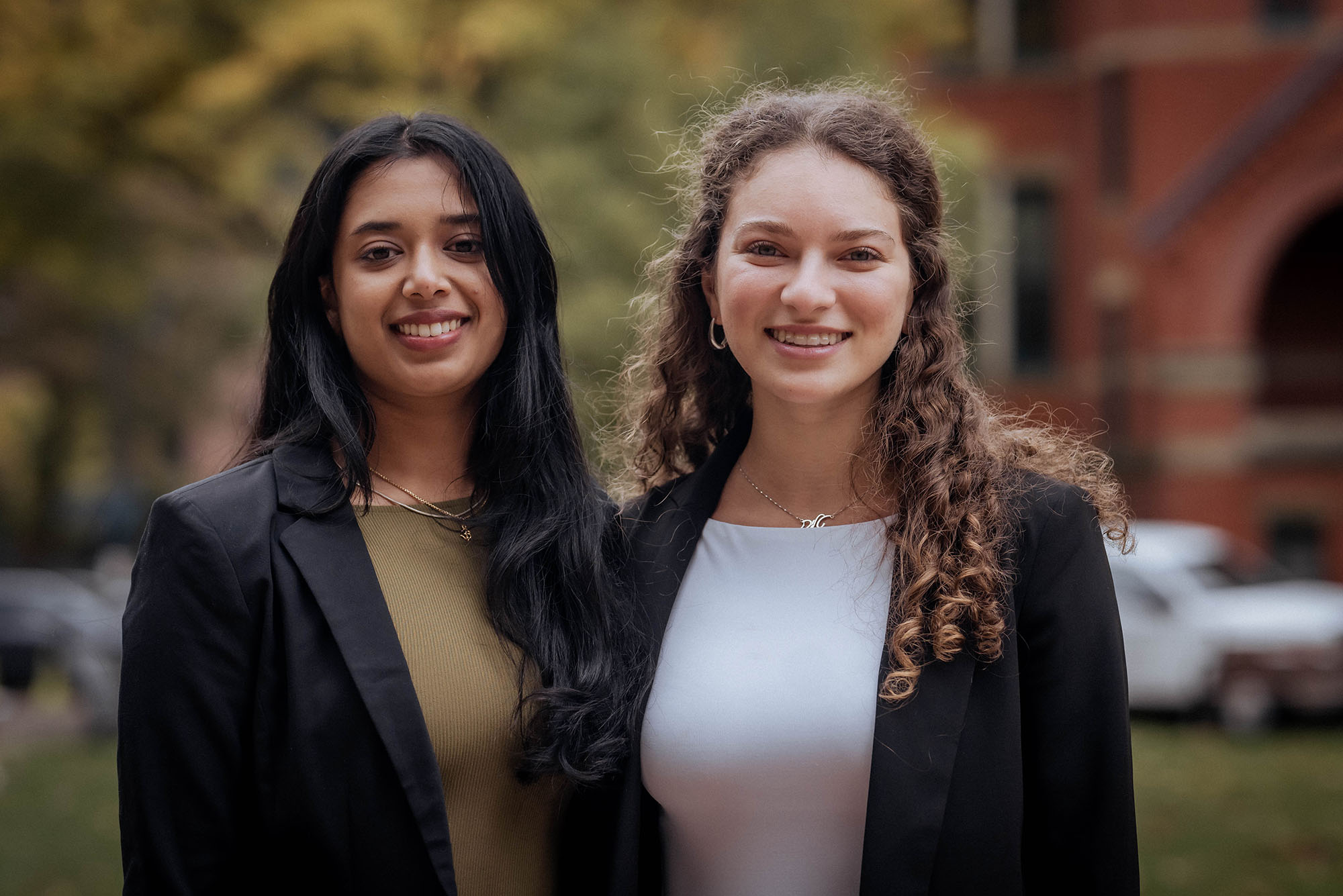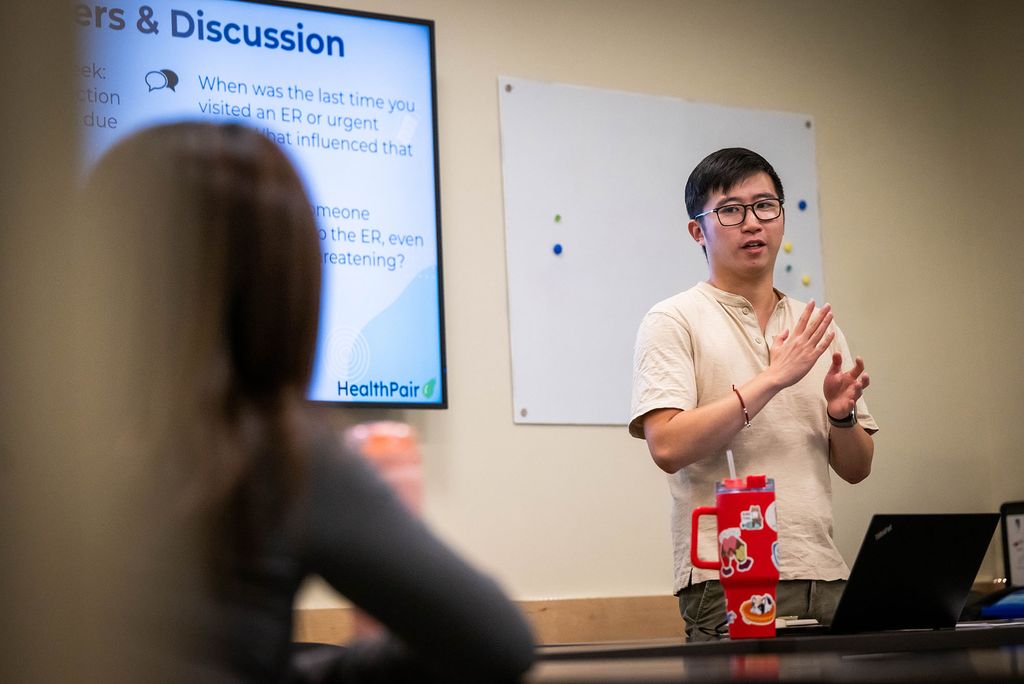New BU Hub Class Teaches Students How to Navigate the US Healthcare System

Tanusha Tholla (CAS’25, CAMED’25) (left) and Talya Cohen (CAS’25, CAMED’25), two founders of the healthcare literacy nonprofit HealthPair, partnered with Student Health Services to create a Hub cocurricular for their peers.
New BU Hub Class Teaches Students How to Navigate the US Healthcare System
Healthcare Literacy 101, a collaboration between former classmates and Student Health Services
The US healthcare system can be incredibly difficult to navigate, even for those who have experience with it. That’s why three Boston University students proposed a new course for fellow students: one that teaches how our medical system works.
Healthcare Literacy, a Hub cocurricular, debuted as a pilot class this semester (it fulfills one Hub unit in Research and Information Literacy). Hub cocurriculars are ungraded, zero-credit courses that promote experiential learning through hands-on projects and activities, as well as discussion and reflection.
Healthcare Literacy covers a range of topics related to healthcare: how health insurance works, how to find providers, how to manage prescriptions, where to find accurate medical information, preventive care basics, and more. For their final project, students have to create a resource hub for BU students on a specific healthcare literacy topic.
The course is the result of a partnership between Student Health Services (SHS) and former and current BU classmates Tanusha Tholla (CAS’25, CAMED’28), Talya Cohen (CAS’25, CAMED’28), and Samara Ruberg (Sargent’24, SPH’25). They are the founders of HealthPair, a nonprofit dedicated to helping young adults develop the skills to take charge of their healthcare journey.
The three started HealthPair in 2022, inspired by hearing some “medical nightmares” from friends and peers, Tholla says. Those stories—such as confusion over where to access treatment for an infection or the snowballing complications from a bad emergency-room diagnosis—“got us thinking, why does it have to be this way?” she says.
Few college courses cover how the medical system functions, Tholla says. That can lead to some nasty surprises for someone suddenly in charge of their health—and in some cases, on their own insurance plan—for the first time. It can also lead to avoiding medical care altogether: HealthPair’s initial research revealed that in Massachusetts, less than a third of young adults see a primary care provider, Tholla says.
“It’s tricky, because young adulthood is often a time when people think they’re relatively healthy and don’t have any medical issues,” she says. “But that’s why I don’t think the onus is on individuals to seek out and find this information; I think it should be on institutions to educate youth, to prepare them better for adulthood and for being better advocates for themselves, their peers, and their families.”
The three initially hoped to start a club at BU based on healthcare literacy. Instead, the Student Leadership & Impact Center connected them with SHS—and a course quickly began to take shape, based on the curriculum HealthPair developed for its online offerings, with BU-specific augmentations by SHS and BU Hub.

Tony Chen, SHS Health Promotion & Prevention assistant director of community and online initiatives, was eager to sign on as the course instructor. A child of immigrants, Chen grew up helping his parents navigate the US medical system. “I saw how confusing it was from an earlier age than a lot of folks,” he says.
Now, as a community-health and student-support professional, he says that “part of my role is to help students feel prepared for their postgraduation life—and that wasn’t happening [regarding things like] picking your own health insurance plan, knowing how it works, and understanding your out-of-pocket costs.”
Going forward, he says, SHS intends to incorporate more healthcare literacy into its suite of resources. The cocurricular is the perfect starting point: “The information that students will get from this course isn’t just relevant for right now,” Chen says. “This is about building lifelong skills to navigate a pretty complex system.”
As the first iteration, part of this semester’s class is about figuring out the most effective lessons and assignments, he says. In his eyes, health insurance literacy is one of the course’s most pertinent topics. But he was also surprised by how strongly students engaged with a brief lecture on health misinformation—which he says makes sense, in retrospect, considering the glut of wellness content on social media.
“I think students are realizing that they’re getting fed so much information online and not all of it is accurate,” Chen says. “We had some good discussions on how we identify reliable sources of information and catching red flags on social media.”
Human physiology major Michelle Chen (Sargent’26) signed up for the cocurricular because she thought it would be helpful for her long-term plans.
“As an international student, I have limited understanding of the healthcare system [here], so I wished to learn more about it,” she says. “Moreover, I am a predental student, so I thought this course would definitely benefit me in the future with a more well-rounded understanding of things such as insurance. So far, I think it’s been very useful; it’s also been interesting to hear classmates’ experiences with the healthcare system.”
HealthPair’s founders hope their efforts empower students to handle their healthcare. But they also hope that has ripple effects.
“We don’t live in isolated environments; the knowledge that we have access to should ultimately be imparted to our circles as well,” Cohen says. “If upon completing the course, someone feels confident to navigate an emergency situation or healthcare setting on their own, that’s ideal. But I really want students who take this class to also feel confident in helping their friends and family navigate healthcare experiences… If people leave our class feeling [secure] with their skills, then we’ve succeeded in our role.”